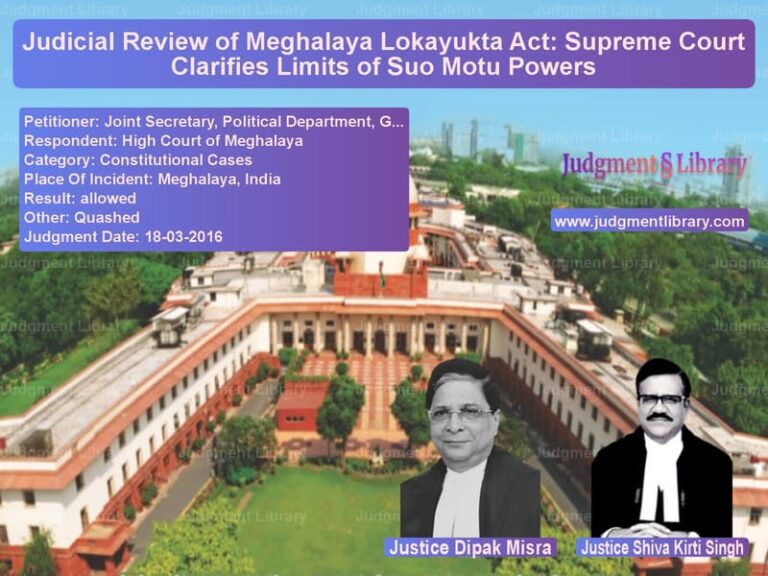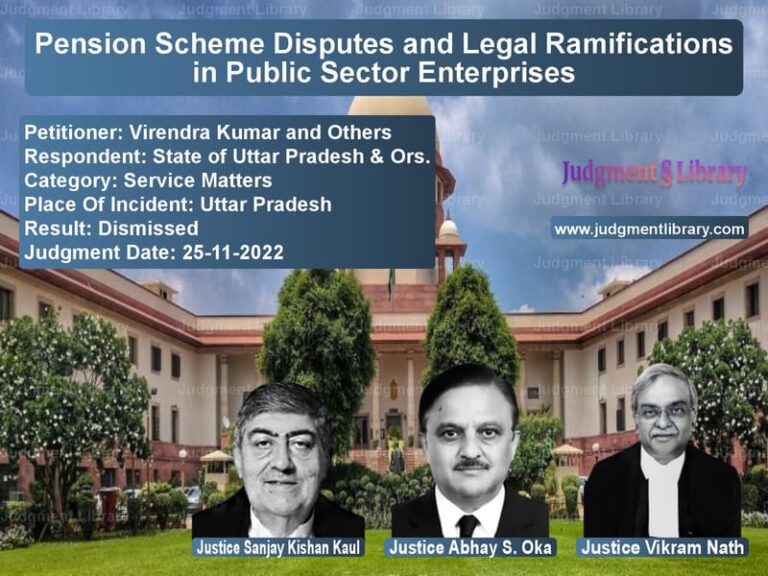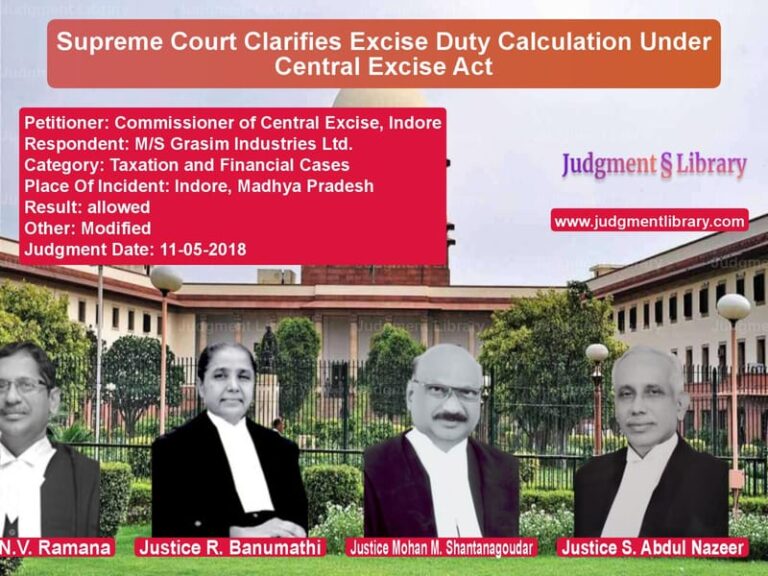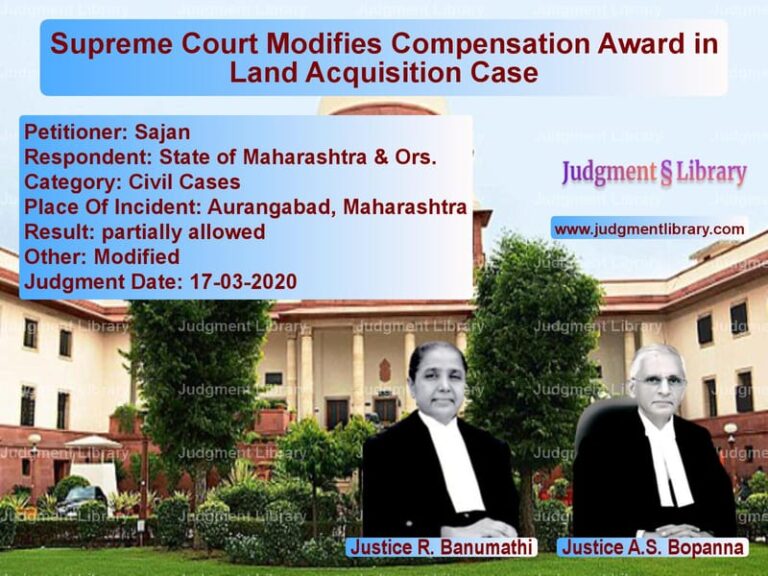Contempt of Court and Compliance of Orders: Key Takeaways from a Landmark Judgment
The case of Jagdish Chander Malik v. Manmohan Juneja is a significant ruling concerning contempt of court and the enforcement of judicial orders. This case was brought before the Supreme Court of India as an appeal against an order of the High Court of Delhi, which had dismissed a contempt petition filed by the appellant.
The core issue in this case was whether the respondent had willfully disobeyed a court order regarding the provision of certain documents by the Registrar of Companies (ROC). The Supreme Court, while dismissing the contempt petition, provided valuable insights into the scope of contempt proceedings and the obligations of parties to comply with court orders.
Background of the Case
The appellant, Jagdish Chander Malik, approached the Supreme Court against an order of the Delhi High Court that dismissed his contempt petition. The contempt petition was based on the alleged non-implementation of an earlier order dated 11.01.2013, which directed the Registrar of Companies (ROC) to provide the appellant with certified copies of certain documents.
The High Court, in its order, held that there was no willful disobedience of its directions and dismissed the contempt petition. The appellant, dissatisfied with this ruling, sought relief from the Supreme Court, arguing that the ROC had failed to comply with the court’s directive.
Legal Issues Raised
- Whether the failure of the Registrar of Companies to provide the requested documents constituted contempt of court.
- The scope of contempt proceedings and the threshold for establishing willful disobedience.
- The extent to which courts can enforce compliance with their orders.
Arguments by the Petitioner
The appellant, Jagdish Chander Malik, contended that the Registrar of Companies had failed to comply with the court’s order and that such failure amounted to contempt. He made the following points:
- The High Court’s order dated 16.08.2012 had directed the ROC to provide the requested documents.
- Despite repeated efforts, the appellant was unable to obtain the documents due to the ROC’s inaction.
- The High Court erred in dismissing the contempt petition without ensuring compliance with its earlier order.
- Contempt proceedings were necessary to uphold the authority of the court and ensure compliance with judicial directives.
Arguments by the Respondent
The respondent, Manmohan Juneja, representing the Registrar of Companies, argued that there was no willful disobedience of the court’s order. The following defenses were presented:
- The appellant had failed to visit the ROC office on the designated date for document collection.
- The High Court had given the appellant an opportunity to fix another date for compliance, but he refused to do so.
- There was no deliberate attempt to withhold the documents, and the issue arose due to procedural delays.
- Contempt proceedings should not be used as a means to enforce compliance with administrative processes.
Supreme Court’s Judgment
The Supreme Court, in its ruling, agreed with the High Court’s conclusion that there was no willful disobedience of the court’s order. However, the Court acknowledged the appellant’s concerns and provided the following key directions:
“The appellant only ultimately wants compliance of his application for which he had been granted a date to approach the ROC. We are of the view that it is in the interests of justice that a further liberty is granted to the appellant.”
The Court ruled that the appellant should be given another opportunity to collect the documents within a period of two months. It directed the Registrar of Companies to facilitate compliance with the order of 16.08.2012 and provide the required documents without further delay.
Key Legal Takeaways
The judgment offers important legal principles concerning contempt of court and judicial compliance:
1. Contempt Requires Willful Disobedience
The Supreme Court reaffirmed that contempt of court is applicable only when there is a deliberate and willful disobedience of a judicial order. Mere procedural delays or miscommunications do not automatically constitute contempt.
2. Courts Must Ensure Effective Compliance
While the Court dismissed the contempt petition, it recognized the appellant’s grievance and provided a remedy by granting him additional time to obtain the documents. This highlights the Court’s role in balancing procedural fairness with judicial enforcement.
3. Contempt Proceedings Are Not Substitutes for Administrative Enforcement
The Court cautioned against using contempt petitions as a substitute for administrative enforcement. If a party faces difficulties in obtaining compliance with a court order, the proper remedy is to seek further directions rather than initiate contempt proceedings.
4. Judicial Orders Must Be Implemented in Good Faith
The ruling serves as a reminder that all government authorities and agencies must act in good faith when implementing court orders. Even if contempt is not established, non-compliance can still lead to judicial scrutiny.
Impact of the Judgment
The Supreme Court’s decision has significant implications for how contempt proceedings are handled in India:
- It sets a precedent for distinguishing between administrative non-compliance and contempt of court.
- It reinforces that judicial remedies should be exhausted before initiating contempt proceedings.
- It ensures that individuals seeking enforcement of court orders have an avenue for relief without resorting to punitive measures.
Conclusion
The case of Jagdish Chander Malik v. Manmohan Juneja serves as a crucial precedent in contempt law. It clarifies that contempt is not an automatic remedy for non-compliance but requires willful disobedience of a court order. At the same time, the Supreme Court ensured that the appellant was not left without a remedy by allowing him additional time to obtain the necessary documents.
This ruling highlights the importance of a balanced approach in enforcing court orders while maintaining judicial dignity. It upholds the principle that while courts have the power to punish for contempt, they must also facilitate compliance through constructive remedies. The judgment thus strengthens the legal framework governing contempt proceedings and ensures that justice is served fairly and efficiently.
Don’t miss out on the full details! Download the complete judgment in PDF format below and gain valuable insights instantly!
Download Judgment: Jagdish Chander Mali vs Manmohan Juneja Supreme Court of India Judgment Dated 21-08-2017.pdf
Direct Downlaod Judgment: Direct downlaod this Judgment
See all petitions in Contempt Of Court cases
See all petitions in Legal Malpractice
See all petitions in Public Interest Litigation
See all petitions in Judgment by Kurian Joseph
See all petitions in Judgment by Mohan M. Shantanagoudar
See all petitions in dismissed
See all petitions in Declared Infructuous
See all petitions in supreme court of India judgments August 2017
See all petitions in 2017 judgments
See all posts in Civil Cases Category
See all allowed petitions in Civil Cases Category
See all Dismissed petitions in Civil Cases Category
See all partially allowed petitions in Civil Cases Category







